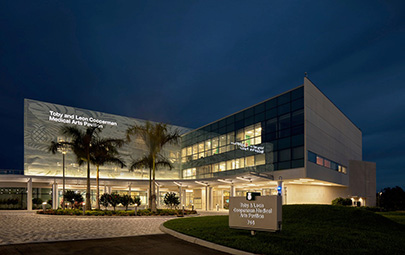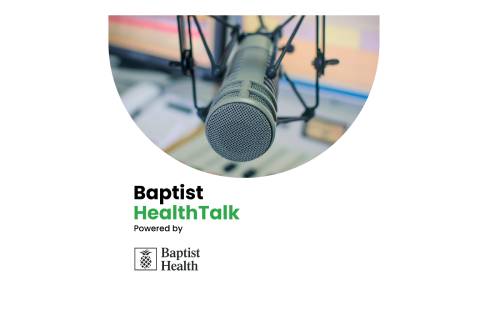
Life
Urgent Care Expert: What You Can Do When You've Got the Flu
5 min. read
Did you wake up this morning feeling achy and sick? Did you happen to notice a sore throat, a runny nose and a cough, possibly along with a fever and a headache? You may have the flu, local health care experts say.
According to the U.S. Centers for Disease Control & Prevention (CDC), flu is on the rise across South Florida—and peak flu season is still a few months away. Flu, the CDC says, is a contagious respiratory illness caused by influenza viruses that infect the nose, throat and sometimes the lungs. “It can cause mild to severe illness and at times even lead to death,” the CDC warns.
Resource editors spoke with Katie Acquino, D.O., medical director for Baptist Health Urgent Care Express in Palm Beach County, about how this year’s flu season starting off and how best to treat the flu if you’re unlucky enough to get it.

Katie Acquino, D.O., medical director for Baptist Health Urgent Care Express in Palm Beach County
Resource: How is this year’s flu season shaping up so far?
Katie Aquino, D.O.: According to the CDC, this year’s fall and winter virus season will be similar to the 2022 season—they predict a moderate COVID-19 wave and “typical” flu and RSV (respiratory syncytial virus). Flu cases here have definitely been ramping up in recent weeks. As of mid-October, the Florida Health Department has Palm Beach, Broward, and Miami-Dade counties all trending up in the number of cases.
Resource: What else has been driving people to Urgent Care lately?
K.A.: Once fall arrives, we see a lot of people coming in with seasonal allergies. Of course, these can have symptoms similar to typical colds, which we also see a lot of as we get further into the fall and winter months.
Resource: How long does it take for flu symptoms to arise when you’ve been exposed?
K.A.: The time from when you have been exposed to the flu virus to the time it takes to develop symptoms can vary, and your symptoms can come on suddenly. Usually, it is between one to four days. On average, most people develop symptoms within 48 hours of being exposed to the virus.
Resource: What are some of the typical symptoms people can expect with flu?
K.A.: People with flu usually feel quite sick, with a variety of symptoms including:
• Fever or chills
• Cough
• Sore throat
• Runny or stuffy nose
• Muscle or body aches
• Headaches
• Fatigue (tiredness)
It’s important to note that not everyone with flu will have a fever. Also, some people with flu may have vomiting and diarrhea, though this is more common in children than adults.
Resource: Someone thinks they have the flu—what should they do?
K.A.: If you have flu-like symptoms, you should stay home from school or work until your symptoms have resolved. Rest and hydration are key in treating the flu. If you are at higher risk for complications—as young children and the elderly are, typically—or if you feel very ill, it is important to see your doctor. If you are unable to get an appointment with your doctor, you can visit any of our Urgent Care or Urgent Care Express locations in South Florida for rapid diagnosis and treatment. You can also easily access flu care online via the Baptist Health PineApp.
Resource: How long do flu symptoms typically last?
Most flu symptoms last from five to seven days. If you have had this year’s influenza vaccine, your symptoms may be less severe and last a shorter amount of time. Also, there are a few antiviral medications that have been approved for the treatment of flu, the most common of which is Tamiflu. If you are prescribed Tamiflu by your physician, your symptoms can be lessened typically by a day. When you’re feeling sick with the flu, every day counts.
Resource: How is a flu diagnosis confirmed?
K.A.: Many flu symptoms are similar to that of COVID-19, so it is very hard to differentiate without an actual test. At Baptist Health Urgent Care and Urgent Care Express, we use the in-office Rapid Flu test, a fluorescent immunoassay test from a simple nasal swab that takes just 15 minutes for results. It tests for the two dominant strains—flu A and B. Also, all of our locations have a combination Flu and COVID-19 test. This is convenient for our patients as it is only one nasal swab, it takes just 15 minutes and we can test for both flu and COVID-19 at the same time.
Resource: What are some of the most effective treatments for those who have the flu?
K.A.: The most important treatment for the flu is to rest and stay hydrated by drinking plenty of fluids. Also, taking over the counter (OTC) cough and fever medications can help treat some of your symptoms. They won’t reduce the duration of symptoms, however. Pain-relieving medications such as Tylenol (acetaminophen) or Advil (ibuprofen) can help fight body aches, headaches and fever, which are some of the most common symptoms of flu.
Resource: Why should someone visit Baptist Health Urgent Care if they feel sick?
K.A.: It’s always a good idea to see a clinician when you don’t feel well. If you’re unable to get an appointment with your primary care doctor, we can see you at any of our Urgent Care or Urgent Care express locations, which are open daily from 9 a.m. to 9 p.m. If you prefer to get care from home, you can see our doctors online, with the Baptist Health PineApp.
It’s also a good idea to be tested for the flu. If you do test positive, the sooner you get started on the antiviral medication the greater the chances the medication can help prevent serious complications. Antiviral medications are by prescription only, however, and they do have side effects, so be sure to talk to your doctor about their risks and benefits.
Resource: Are flu vaccines available at Urgent Care and Urgent Care Express?
K.A.: Yes, flu vaccines are available at all Baptist Health Urgent Care and Urgent Care Express locations. Being vaccinated against the flu each year—especially for children and the elderly—puts you at a lower risk of getting seriously ill from the flu. The regular dose is available as well as the high dose for individuals 65 and older. If your insurance is accepted, it can be used and often covers the vaccine completely. Without insurance, the vaccine is available at the self-pay rate of $40 for the regular dose and $90 for the high dose, which is cheaper than most retail pharmacies charge.
Dr. Acquino reminds Resource readers that protecting themselves against the flu is always a smart move, especially as we approach Thanksgiving and the Holidays. “Nobody wants to be sick—especially this time of year as we start thinking about traveling and gathering with our families,” she says. “So get your flu vaccine now and know that if you do get sick, we’re here to care for you seven days a week.”
Healthcare that Cares
Related Stories
View All Articles
New Medical Arts Pavilion Meets Future Needs of Boca Raton Community
March 4, 2024
2 min. read
Video

